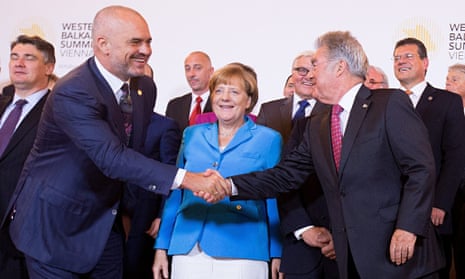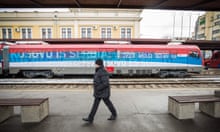David Cameron’s unrealistic commitment to cut net migration to below 100,000 must now surely go. It was never possible to meet, if only due to international obligations and because, as employers such as the Institute of Directors repeatedly tell him, it was not just unachievable but undesirable. But the consequence of setting an impossible target is to damage still further public confidence while reinforcing the false perceptions of Britain under siege that are fostered by images of razor-wired migrant camps in Calais. Meanwhile, at least 20 bodies have been found in the back of an abandoned Hungarian truck on an Austrian motorway, to add to the bodies of at least 50 migrants found on a boat making the crossing to Italy from Libya. Finding an EU-wide solution to the greatest movement of peoples since the second world war is an urgent priority.
So the Vienna meeting of EU and Balkan leaders on Thursday was timely. It is 15 years since the chapter of armed conflicts in south-east Europe was closed. But the current flow of Balkan migrants heading towards Europe’s more affluent north demonstrates, among other things, how much has been lacking in the EU’s efforts to forge a strategy for this economically and politically fragile region. One reason why thousands of families from Kosovo and elsewhere are uprooting themselves to join the crowds from Syria and Afghanistan to try to reach Germany and Scandinavia is that the long wait for EU accession, and for better living prospects, never materialised. The leaderships of Balkan countries have certainly been at fault, failing to tackle corruption and poor governance. The prospect of better-paid jobs in Germany, as well as the lure of traffickers’ networks, have equally been at play. But the question of the EU’s role cannot be diminished: if people stop believing their country can offer a chance of a better future, at the very least for their children, they will pick up a suitcase and seek a better life elsewhere.
The non-EU Balkan states are in a limbo that needs to be addressed more urgently than has been the case. After Croatia joined the EU in 2013, accession has all but stalled. Macedonia’s president describes his country as a nation “stuck in an elevator”; talks with the EU have been going nowhere because of a naming dispute with Greece. Serbia’s and Montenegro’s talks are similarly frustrating despite the very recent – welcome – political agreement between Serbia and Kosovo. Kosovo, together with Albania, are the two biggest Balkan “producers” of EU migrants. That in itself is absurd: the situation in these countries would not ordinarily be anywhere near legitimising an asylum claim. What drives these departures are mostly economic factors, and political frustration.
Fixing the Balkans is an unfinished task that the EU must now concentrate on as part of its overall response to the migration crisis. Letting a bad situation get worse would only bring more problems – political and economic – in its wake, as well as more geopolitical uncertainty as Russia tries to grow its influence in a region about which it has always been proprietorial. Last year, the EU commission’s president, Jean-Claude Juncker, said there would be no EU enlargement over the next five years. That was a disheartening message to send out to the Balkans. In Vienna, EU leaders must get it right and send out a clear signal that, given the right reforms, the door will not be closed for ever.








